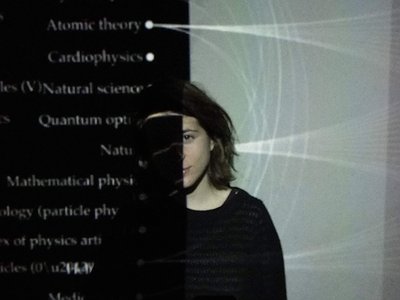Could you take us through a day in your life, from a possible morning routine through to your work? Do you have a fixed schedule? How do music and other aspects of your life feed back into each other - do you separate them or instead try to make them blend seamlessly?
Right now I'm doing a master’s degree in documentary film, which limits my schedule and absorbs a lot of my time. Although these studies might seem distant to music, I could say that this discipline, in its most creative version, also helps me to explore new uses of sound in other audio-visual media, since the sound design is something that has interested for a long time. I would like to delve into sound design in the future. As for the intrinsically musical aspect, I do not have a predefined plan, I try not to force the creative process, but to dedicate myself to it when I am more inspired and I see a plausible idea developing.
Could you describe your creative process on the basis of a soundtrack or album that's particularly dear to you, please? Where did the ideas come from, how were they transformed in your mind, what did you start with and how do you refine these beginnings into the finished work of art?
The process followed in my piece “Doce Percepciones de un Silencio” is totally different from what I normally do. The most complicated thing was to elaborate the visual lomographic part. Because of its experimental element, I decided to try to make a sound composed by different environments made with a MIDI controller. I recorded sounds that form 3D travel for earphones, in which the breaths move from one ear to another to represent more intimately the spectator and listener. I usually work with a more melodic base, since I am a guitarist, but I thought it would be interesting to explore this new aspect and not limit myself to what I always did.
There are many descriptions of the ideal state of mind for being creative. What is it like for you? What supports this ideal state of mind and what are distractions? Are there strategies to enter into this state more easily?
For me the most important thing is to know firstly the feeling I want to capture and then isolate myself. To have a clear message beyond trying and doing something melodically concordant. There is no use in consolidating a vacuum message.
How do you see the relationship between the 'sound' aspects of film music and the 'composition' aspects? How do you work with sound and timbre to meet certain production ideas and in which way can certain sounds already take on compositional qualities?
I guess each sound is evocative of itself by its qualities. However, it is up to us to use appropriate compositions or simply to explore how a sound is linked to the image and what kind of relationship it has.
Our sense of hearing shares intriguing connections to other senses. From your experience, what are some of the most inspiring overlaps between different senses - and what do they tell us about the way our senses work? What happens to sound at its outermost borders?
Music is evocative in every way possible. I think the environments and textures can become almost tactile and I think a sound can evoke a memory or an image. This last relationship is the one I'm most interested in due to my connection to the world of image.
Art can be a purpose in its own right, but it can also directly feed back into everyday life, take on a social and political role and lead to more engagement. Can you describe your approach to art and being an artist?
I see my approach as an intimate concept, as something purely personal. I am interested in the exploration of the self and the conception of art.
It is remarkable, in a way, that we have arrived in the 21st century with the basic concept of soundtracks still intact. Do you have a vision of music, an idea of what film music could be beyond its current form?
Little by little the concept of performance is gaining ground in music. Among some communities in particular and depending on the type of consumer you can get to prioritize the show. I believe that music, scenery and the visual part must enrich each other and help make the total experience more interesting, not simply serve to supply gaps between the disciplines that make up a whole.


